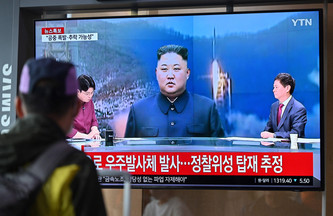Posted by BW Actual on Jun 1st 2023
BLACKWATER USA | DAILY BRIEF
U.S.
- The U.S. House overwhelmingly passed a bill suspending the Treasury's debt ceiling to avoid a debt default. The bill now goes to the Senate, where it seems to have enough support to pass.
Russia / Ukraine
- Russian officials complained about the West's hesitance to condemn drone strikes over Moscow. Ex-president Medvedev said that hesitance showed that Ukrainian allies like the UK are "de facto ... leading an undeclared war against Russia" - and thus any UK official "can be considered as a legitimate military target."
- Meanwhile, falling debris from Russian missiles launched at Kyiv killed at least three civilians, including a child and her mother. Ukraine says it intercepted all 10 missiles, though.
- The Economist had a great explainer - pasted below - about the two pro-Ukrainian militias launching attacks into Russia's Belgorod region. While Ukraine's senior military officials are keeping their distance and denying links to both militias, both of them apparently quietly coordinate with Ukrainian intelligence.
- Separately, South Africa granted Pres. Putin diplomatic immunity to attend the BRICS summit in August, which means it does not plan to act on its duty - as a member of the International Criminal Court (ICC) - to carry out the ICC's warrant for his arrest, should he set foot in the country.
North Korea
- Kim Jong Un's sister, Kim Yo Jong, vowed that North Korea would make another attempt at placing a spy satellite into orbit after its first launch failed this week.
Sudan
- Sudan's military withdrew from cease-fire negotiations with its paramilitary rival, the Rapid Support Forces. Their seven-day ceasefire expired on Monday, and it now looks even less likely that they'll agree to a new one soon.
Who are the pro-Ukrainian militias raiding Russia’s Belgorod region? (Economist)
They have links to Ukrainian military intelligence and, in some cases, to the far right
In the late afternoon of May 22nd footage emerged of two grinning pro-Ukrainian fighters in the midst of a cross-border raid into Russia. “The key to the border has been broken in half,” says one, quoting from “Everything is Going to Plan”, a cult anthem by Civil Defence, a Russian rock band. But the attack that the two men had helped engineer showed that, for Russia, things were very much not going to plan. It included: an illegal crossing from Ukraine into Belgorod, a Russian region on the border, by tanks and infantry fighting vehicles; the death of at least one border guard; farm buildings on fire; a downed helicopter; traffic jams of fleeing locals; and the reported evacuation of a nuclear-arms facility several kilometres into Russian territory. Who was responsible for the incursion?
Members of two militias that oppose Vladimir Putin—the Russian Volunteer Corps and the Free Russia Legion—claimed to have “liberated” several border villages. The groups appear to be based in Ukraine, from where they mount their attacks. Russia says that the militias are a front for the Ukrainian military; Ukraine insists that they are Russian dissidents. The reality is somewhere in between. Both militias do indeed recruit disaffected Russian nationals. Both also co-ordinate their activities with hur, Ukraine’s military-intelligence agency. Yet the groups have no formal connection to the Ukrainian government. That allows Ukrainian officials to distance themselves from the militias’ operations, however implausibly.
As news tumbled in from Belgorod, Ukraine’s presidential spokesman, Mykhailo Podolyak, said his government was a bystander. Any tanks used in the attack could simply have been bought at a military store, he quipped, mimicking the bogus narratives used by Russia when its hardware first appeared in eastern Ukraine in 2014. Andrei Chernak, a spokesman for hur, said that the fighting inside Russia was part of a “national uprising” by Russians. Soldiers had “taken up arms…to defend their freedom and independence”, he claimed. Mr Chernak said nothing about where the arms might have originated.
The Kremlin sought to downplay the embarrassing security breach. Russian officials described it as an attempt by Ukraine to “deflect attention” from what they claimed was their capture of the long-contested town of Bakhmut on May 20th (Ukraine says it still holds buildings and trenches on Bakhmut’s south-western edge). On May 23rd the Russian defence ministry claimed to have killed or expelled all the militia fighters from Belgorod, though provided no evidence.
A high-level Ukrainian intelligence source, speaking on the condition of anonymity, offers a more realistic assessment. Two ideas underpinned the operation in Belgorod, he says. The first was to undermine Mr Putin’s domestic authority: if a strongman can’t guarantee security, what is the point of him? The second was to pull Russian military reserves away from critical sections of the front lines, in the run-up to a long-planned Ukrainian counter-offensive. It is too early to tell if the operation was successful, the source adds.
This is not the first foray by Ukraine-backed militias into Russian territory. The Free Russia Legion and Russian Volunteer Corps were formed last year, under opaque circumstances, but came to prominence this March when they spearheaded an incursion from Ukraine into Bryansk, another border region. Russia claimed that two civilians were killed in that attack, but offered no proof.
The two militias differ in organisation and ideology. The Free Russia Legion is more chaotic and closer to hur; the Russian Volunteer Corps is better disciplined but has far-right leanings. Michael Colborne, an expert on the Ukrainian far right, has identified members of the Russian Volunteer Corps as having a history in Russia’s neo-Nazi movement. Mr Chernak said that the “existential” danger Ukraine faces means that military intelligence cannot be too choosy about whom it collaborates with. Survival is Ukraine’s only focus, he said. “We are prepared to work with everyone.”

